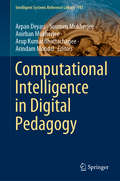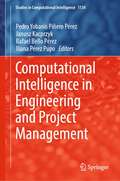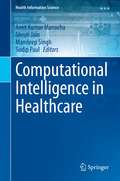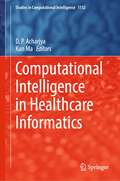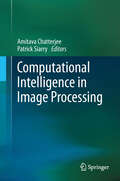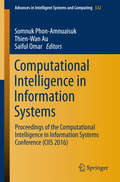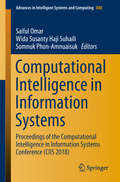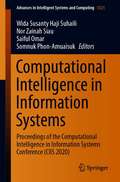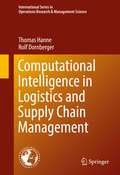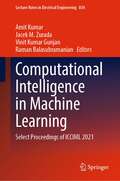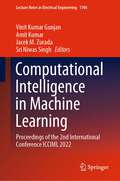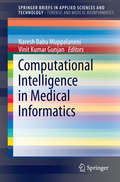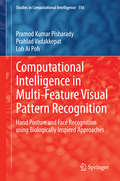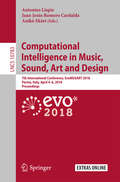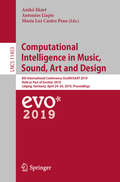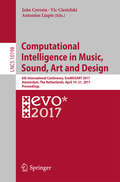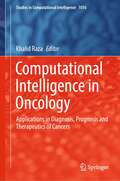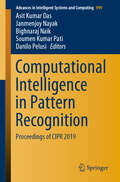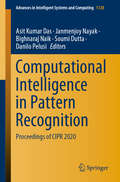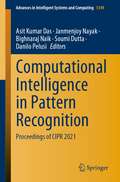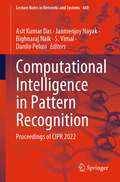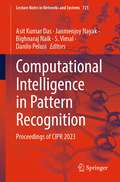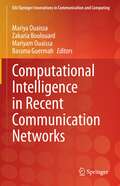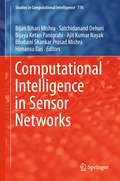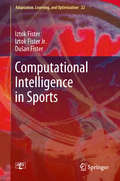- Table View
- List View
Computational Intelligence in Digital Pedagogy (Intelligent Systems Reference Library #197)
by Arpan Deyasi Soumen Mukherjee Anirban Mukherjee Arup Kumar Bhattacharjee Arindam MondalThis book is a useful guide for the teaching fraternity, administrators and education technology professionals to make good use of AI across outcome-based technical education (OBTE) ecosystem and infuse innovations and affordable digital technologies to traditional pedagogic processes to make teaching-learning more independent of human factor (teacher/student quality), time and place and at the same time more impactful and enjoyable for the learners. Providing access to the digital media and learning tools (even to the extent of mobile apps) to the students would allow them to keep pace with innovations in learning technologies, learn according to their own pace and improve their understanding level and have instantaneous feedback and evaluation. The book explores these new challenges and scope of using computational intelligence in educational technology. The book also addresses how based on the data collected from the outcome of conventional educational system, intelligent diagnostic and feedback system is developed which will change the teaching strategies and corresponding teaching-learning process. The book covers a wider framework of digital pedagogy and its intelligent applications on various sectors of education system.
Computational Intelligence in Engineering and Project Management (Studies in Computational Intelligence #1134)
by Pedro Yobanis Piñero Pérez Janusz Kacprzyk Rafael Bello Pérez Iliana Pérez PupoThis book is dedicated to all those interested in the application of artificial intelligence in engineering and project management. Most of the jobs are focused on achieving agile project development. New algorithms that combine various computational intelligence techniques are applied in different areas of knowledge in project management.In this book, computational intelligence is presented as the branch of AI that encompasses various techniques aimed at simulating human tolerance in decision-making processes in environments with uncertainty and imprecision. Among the precursor techniques of computational intelligence are: evolutionary algorithms, artificial neural networks, fuzzy set theory, and fuzzy systems. However, other areas such as the rough set, linguistic data summary, natural language processing, the conversational systems, fuzzy cognitive maps, collective intelligence, the neutrosophic theory, and other fuzzy logic extensions are contributing to the application and extension of computational intelligenceThe book is organized into three parts, as shown below. The first part constitutes a critical review of computational intelligence in project management. The second part presents new computational intelligence techniques and their applications in project planning, control, and monitoring processes. In particular, the use of conversational systems and their applicability in the agile management of portfolio programs and projects stand out. Part three of the book exemplifies the use of computing techniques with words and other computational intelligence techniques for organizational decision-making.The authors of the book stand out for their extensive experience in the development of basic and applied applications of computational intelligence. The authors Janusz Kacprzyk, Pedro Y. Piñero Pérez, Rafael E. Bello Pérez, and Iliana Pérez Pupo have published several books associated with artificial intelligence and computational intelligence applied to projects. They continue working on fundamental-oriented and applied research on different artificial intelligence techniques to help with decision-making in different areas of knowledge.Authors would like to thank all the engineers, professors, and researchers without whose efforts this book could not have been written.
Computational Intelligence in Healthcare (Health Information Science)
by Amit Kumar Manocha Shruti Jain Mandeep Singh Sudip PaulArtificial intelligent systems, which offer great improvement in healthcare sector assisted by machine learning, wireless communications, data analytics, cognitive computing, and mobile computing provide more intelligent and convenient solutions and services. With the help of the advanced techniques, now a days it is possible to understand human body and to handle & process the health data anytime and anywhere. It is a smart healthcare system which includes patient, hospital management, doctors, monitoring, diagnosis, decision making modules, disease prevention to meet the challenges and problems arises in healthcare industry. Furthermore, the advanced healthcare systems need to upgrade with new capabilities to provide human with more intelligent and professional healthcare services to further improve the quality of service and user experience. To explore recent advances and disseminate state-of-the-art techniques related to intelligent healthcare services and applications. This edited book involved in designing systems that will permit the societal acceptance of ambient intelligence including signal processing, imaging, computing, instrumentation, artificial intelligence, internet of health things, data analytics, disease detection, telemedicine, and their applications. As the book includes recent trends in research issues and applications, the contents will be beneficial to Professors, researchers, and engineers. This book will provide support and aid to the researchers involved in designing latest advancements in communication and intelligent systems that will permit the societal acceptance of ambient intelligence. This book presents the latest research being conducted on diverse topics in intelligence technologies with the goal of advancing knowledge and applications healthcare sector and to present the latest snapshot of the ongoing research as well as to shed further light on future directions in this space. The aim of publishing the book is to serve for educators, researchers, and developers working in recent advances and upcoming technologies utilizing computational sciences.
Computational Intelligence in Healthcare Informatics (Studies in Computational Intelligence #1132)
by D. P. Acharjya Kun MaThe book presents advancements in computational intelligence in perception with healthcare applications. Besides, the concepts, theory, and applications in various domains of healthcare systems including decision making in healthcare management, disease diagnosis, and electronic health records will be presented in a lucid manner. To achieve these objectives, both theoretical advances and its applications to healthcare problems will be stressed upon. This has been done to make the edited book more flexible and to stimulate further research interest in topics. The book is divided into four sections such as theoretical foundation of computational intelligence techniques, computational intelligence in analyzing health data, computational intelligence in electronic health record (EHR), and computational intelligence in ethical issues in health care.
Computational Intelligence in Image Processing
by Patrick Siarry Amitava ChatterjeeComputational intelligence based techniques have firmly established themselves as viable, alternate, mathematical tools for more than a decade. They have been extensively employed in many systems and application domains, among these signal processing, automatic control, industrial and consumer electronics, robotics, finance, manufacturing systems, electric power systems, and power electronics. Image processing is also an extremely potent area which has attracted the attention of many researchers who are interested in the development of new computational intelligence-based techniques and their suitable applications, in both research problems and in real-world problems. Part I of the book discusses several image preprocessing algorithms; Part II broadly covers image compression algorithms; Part III demonstrates how computational intelligence-based techniques can be effectively utilized for image analysis purposes; and Part IV shows how pattern recognition, classification and clustering-based techniques can be developed for the purpose of image inferencing. The book offers a unified view of the modern computational intelligence techniques required to solve real-world problems and it is suitable as a reference for engineers, researchers and graduate students.
Computational Intelligence in Information Systems: Proceedings of the Computational Intelligence in Information Systems Conference (CIIS 2016) (Advances in Intelligent Systems and Computing #532)
by Somnuk Phon-Amnuaisuk Thien-Wan Au Saiful OmarThis book constitutes the Proceedings of the Computational Intelligence in Information Systems conference (CIIS 2016), held in Brunei, November 18-20, 2016. The CIIS conference provides a platform for researchers to exchange the latest ideas and to present new research advances in general areas related to computational intelligence and its applications. The 26 revised full papers presented in this book have been carefully selected from 62 submissions. They cover a wide range of topics and application areas in computational intelligence and informatics.
Computational Intelligence in Information Systems: Proceedings of the Computational Intelligence in Information Systems Conference (CIIS 2018) (Advances in Intelligent Systems and Computing #888)
by Saiful Omar Wida Susanty Haji Suhaili Somnuk Phon-AmnuaisukThis book constitutes the Proceeding of the Computational Intelligence in Information Systems conference (CIIS 2018), held in Brunei, November 16 - 18, 2018. The CIIS conference provides a platform for researchers to exchange the latest ideas and to present new research advances in general areas related to computational intelligence and its application. The 19 revised papers presented in this book have been carefully selected from 41 submissions. The Conference contributes to major fields of the Computing and Information Systems in theoretical and practical aspects. This include Computational Intelligence Techniques, Data Mining, Big Data, the Internet of Things (IoTs), Machine Learning, Predictive Analytics, Product and Design technology, Smart Products, Human Centered Design (HCD), Additive Manufacturing, Information Security, Computer Networks and Cyber Technologies.
Computational Intelligence in Information Systems: Proceedings of the Computational Intelligence in Information Systems Conference (CIIS 2020) (Advances in Intelligent Systems and Computing #1321)
by Wida Susanty Haji Suhaili Nor Zainah Siau Saiful Omar Somnuk Phon-AmuaisukThis book constitutes the Proceeding of the Computational Intelligence in Information Systems conference (CIIS 2020), held in Brunei, January 25–27, 2021. The CIIS conference provides a platform for researchers to exchange the latest ideas and to present new research advances in general areas related to computational intelligence and its applications. The 23 revised papers presented in this book have been carefully selected from 55 submissions.
Computational Intelligence in Logistics and Supply Chain Management (International Series in Operations Research & Management Science #244)
by Thomas Hanne Rolf DornbergerThis book deals with complex problems in the fields of logistics and supply chain management and discusses advanced methods, especially from the field of computational intelligence (CI), for solving them. The first two chapters provide general introductions to logistics and supply chain management on the one hand, and to computational intelligence on the other hand. The subsequent chapters cover specific fields in logistics and supply chain management, work out the most relevant problems found in those fields, and discuss approaches for solving them. Chapter 3 discusses problems in the field of production and inventory management. Chapter 4 considers planning activities on a finer level of granularity which is usually denoted as scheduling. In chapter 5 problems in transportation planning such as different types of vehicle routing problems are considered. While chapters 3 to 5 rather discuss planning problems which appear on an operative level, chapter 6 discusses the strategic problem of designing a supply chain or network. The final chapter provides an overview of academic and commercial software and information systems for the discussed applications. There appears to be a gap between general textbooks on logistics and supply chain management and more specialized literature dealing with methods for computational intelligence, operations research, etc. , for solving the complex operational problems in these fields. For readers, it is often difficult to proceed from introductory texts on logistics and supply chain management to the sophisticated literature which deals with the usage of advanced methods. This book fills this gap by providing state-of-the-art descriptions of the corresponding problems and suitable methods for solving them.
Computational Intelligence in Machine Learning: Select Proceedings of ICCIML 2021 (Lecture Notes in Electrical Engineering #834)
by Amit Kumar Vinit Kumar Gunjan Jacek M. Zurada Raman BalasubramanianThe book includes select proceedings of the International Conference on Computational Intelligence in Machine Learning (ICCIML 2021). The book constitutes peer-reviewed papers on machine learning, computational intelligence, the internet of things, and smart city applications emphasizing multi-disciplinary research in artificial intelligence and cyber-physical systems. This book addresses the comprehensive nature of computational intelligence, artificial intelligence, machine learning, and deep learning to emphasize its character in modeling, identification, optimization, prediction, forecasting, and control of future intelligent systems. The book will be useful for researchers, research scholars, and students to formulate their research ideas and find future directions in these areas. It will help the readers to solve a diverse range of problems in industries and their real-world applications.
Computational Intelligence in Machine Learning: Proceedings of the 2nd International Conference ICCIML 2022 (Lecture Notes in Electrical Engineering #1106)
by Vinit Kumar Gunjan Amit Kumar Jacek M. Zurada Sri Niwas SinghThis volumes comprises select proceedings of the International Conference on Computational Intelligence in Machine Learning (ICCIML 2022). The contents cover latest research trends and developments in the areas of machine learning, smart cities, IoT, Artificial Intelligence, cyber physical systems, cybernetics, data science, neural network, cognition, among others. It also addresses the comprehensive nature of computational intelligence, AI, ML and DL to emphasize its character in modelling, identification, optimization, prediction, forecasting, and control of future intelligent systems. This volume will be a useful guide to those working as researchers in academia and industry by presenting in-depth fundamental research contributions from a methodological/application perspective in understanding Artificial intelligence and machine learning approaches and their capabilities in solving diverse range of problems in industries and its real-world applications.
Computational Intelligence in Medical Informatics (SpringerBriefs in Applied Sciences and Technology)
by Vinit Kumar Gunjan Naresh Babu MuppalaneniThis Brief highlights Informatics and related techniques to Computer Science Professionals, Engineers, Medical Doctors, Bioinformatics researchers and other interdisciplinary researchers. Chapters include the Bioinformatics of Diabetes and several computational algorithms and statistical analysis approach to effectively study the disorders and possible causes along with medical applications.
Computational Intelligence in Multi-Feature Visual Pattern Recognition: Hand Posture and Face Recognition using Biologically Inspired Approaches (Studies in Computational Intelligence #556)
by Pramod Kumar Pisharady Prahlad Vadakkepat Loh Ai PohThis book presents a collection of computational intelligence algorithms that addresses issues in visual pattern recognition such as high computational complexity, abundance of pattern features, sensitivity to size and shape variations and poor performance against complex backgrounds. The book has 3 parts. Part 1 describes various research issues in the field with a survey of the related literature. Part 2 presents computational intelligence based algorithms for feature selection and classification. The algorithms are discriminative and fast. The main application area considered is hand posture recognition. The book also discusses utility of these algorithms in other visual as well as non-visual pattern recognition tasks including face recognition, general object recognition and cancer / tumor classification. Part 3 presents biologically inspired algorithms for feature extraction. The visual cortex model based features discussed have invariance with respect to appearance and size of the hand, and provide good inter class discrimination. A Bayesian model of visual attention is described which is effective in handling complex background problem in hand posture recognition. The book provides qualitative and quantitative performance comparisons for the algorithms outlined, with other standard methods in machine learning and computer vision. The book is self-contained with several figures, charts, tables and equations helping the reader to understand the material presented without instruction.
Computational Intelligence in Music, Sound, Art and Design
by Antonios Liapis Juan Jesús Romero Cardalda Anikó EkártThis book constitutes the refereed proceedings of the 7th International Conference on Evolutionary Computation in Combinatorial Optimization, EvoMUSART 2018, held in Parma, Italy, in April 2018, co-located with the Evo*2017 events EuroGP, EvoCOP and EvoApplications. The 21 revised full papers presented were carefully reviewed and selected from 33 submissions. The papers cover a wide range of topics and application areas, including: generative approaches to music and visual art; medical art therapy; visualization in virtual reality; jewellery design; interactive evolutionary computation; and the art theory of evolutionary computation.
Computational Intelligence in Music, Sound, Art and Design: 8th International Conference, EvoMUSART 2019, Held as Part of EvoStar 2019, Leipzig, Germany, April 24–26, 2019, Proceedings (Lecture Notes in Computer Science #11453)
by Anikó Ekárt Antonios Liapis María Luz Castro PenaThis book constitutes the refereed proceedings of the 8th International Conference on Evolutionary Computation in Combinatorial Optimization, EvoMUSART 2019, held in Leipzig, Germany, in April 2019, co-located with the Evo*2019 events EuroGP, EvoCOP and EvoApplications. The 16 revised full papers presented were carefully reviewed and selected from 24 submissions. The papers cover a wide range of topics and application areas, including: visual art and music generation, analysis, and interpretation; sound synthesis; architecture; video; poetry; design; and other creative tasks.
Computational Intelligence in Music, Sound, Art and Design: 6th International Conference, EvoMUSART 2017, Amsterdam, The Netherlands, April 19–21, 2017, Proceedings (Lecture Notes in Computer Science #10198)
by João Correia, Vic Ciesielski and Antonios LiapisThis book constitutes the refereed proceedings of the 6th International Conference on Evolutionary Computation in Combinatorial Optimization, EvoMUSART 2017, held in Amsterdam, The Netherlands, in April 2017, co-located with the Evo*2017 events EuroGP, EvoCOP and EvoApplications. The 24 revised full papers presented were carefully reviewed and selected from 29 submissions. The papers cover a wide range of topics and application areas, including: generative approaches to music, graphics, game content, and narrative; music information retrieval; computational aesthetics; the mechanics of interactive evolutionary computation; computer-aided design; and the art theory of evolutionary computation.
Computational Intelligence in Oncology: Applications in Diagnosis, Prognosis and Therapeutics of Cancers (Studies in Computational Intelligence #1016)
by Khalid RazaThis book encapsulates recent applications of CI methods in the field of computational oncology, especially cancer diagnosis, prognosis, and its optimized therapeutics. The cancer has been known as a heterogeneous disease categorized in several different subtypes. According to WHO’s recent report, cancer is a leading cause of death worldwide, accounting for over 10 million deaths in the year 2020. Therefore, its early diagnosis, prognosis, and classification to a subtype have become necessary as it facilitates the subsequent clinical management and therapeutics plan. Computational intelligence (CI) methods, including artificial neural networks (ANNs), fuzzy logic, evolutionary computations, various machine learning and deep learning, and nature-inspired algorithms, have been widely utilized in various aspects of oncology research, viz. diagnosis, prognosis, therapeutics, and optimized clinical management. Appreciable progress has been made toward the understanding the hallmarks of cancer development, progression, and its effective therapeutics. However, notwithstanding the extrinsic and intrinsic factors which lead to drastic increment in incidence cases, the detection, diagnosis, prognosis, and therapeutics remain an apex challenge for the medical fraternity. With the advent in CI-based approaches, including nature-inspired techniques, and availability of clinical data from various high-throughput experiments, medical consultants, researchers, and oncologists have seen a hope to devise and employ CI in various aspects of oncology. The main aim of the book is to occupy state-of-the-art applications of CI methods which have been derived from core computer sciences to back medical oncology. This edited book covers artificial neural networks, fuzzy logic and fuzzy inference systems, evolutionary algorithms, various nature-inspired algorithms, and hybrid intelligent systems which are widely appreciated for the diagnosis, prognosis, and optimization of therapeutics of various cancers. Besides, this book also covers multi-omics exploration, gene expression analysis, gene signature identification of cancers, genomic characterization of tumors, anti-cancer drug design and discovery, drug response prediction by means of CI, and applications of IoT, IoMT, and blockchain technology in cancer research.
Computational Intelligence in Pattern Recognition: Proceedings of CIPR 2019 (Advances in Intelligent Systems and Computing #999)
by Asit Kumar Das Janmenjoy Nayak Bighnaraj Naik Soumen Kumar Pati Danilo PelusiThis book presents practical development experiences in different areas of data analysis and pattern recognition, focusing on soft computing technologies, clustering and classification algorithms, rough set and fuzzy set theory, evolutionary computations, neural science and neural network systems, image processing, combinatorial pattern matching, social network analysis, audio and video data analysis, data mining in dynamic environments, bioinformatics, hybrid computing, big data analytics and deep learning. It also provides innovative solutions to the challenges in these areas and discusses recent developments.
Computational Intelligence in Pattern Recognition: Proceedings of CIPR 2020 (Advances in Intelligent Systems and Computing #1120)
by Janmenjoy Nayak Bighnaraj Naik Asit Kumar Das Soumi Dutta Danilo PelusiThis book features high-quality research papers presented at the 2nd International Conference on Computational Intelligence in Pattern Recognition (CIPR 2020), held at the Institute of Engineering and Management, Kolkata, West Bengal, India, on 4–5 January 2020. It includes practical development experiences in various areas of data analysis and pattern recognition, focusing on soft computing technologies, clustering and classification algorithms, rough set and fuzzy set theory, evolutionary computations, neural science and neural network systems, image processing, combinatorial pattern matching, social network analysis, audio and video data analysis, data mining in dynamic environments, bioinformatics, hybrid computing, big data analytics and deep learning. It also provides innovative solutions to the challenges in these areas and discusses recent developments.
Computational Intelligence in Pattern Recognition: Proceedings of CIPR 2021 (Advances in Intelligent Systems and Computing #1349)
by Asit Kumar Das Janmenjoy Nayak Bighnaraj Naik Soumi Dutta Danilo PelusiThis book features high-quality research papers presented at the 3rd International Conference on Computational Intelligence in Pattern Recognition (CIPR 2021), held at the Institute of Engineering and Management, Kolkata, West Bengal, India, on 24 – 25 April 2021. It includes practical development experiences in various areas of data analysis and pattern recognition, focusing on soft computing technologies, clustering and classification algorithms, rough set and fuzzy set theory, evolutionary computations, neural science and neural network systems, image processing, combinatorial pattern matching, social network analysis, audio and video data analysis, data mining in dynamic environments, bioinformatics, hybrid computing, big data analytics and deep learning. It also provides innovative solutions to the challenges in these areas and discusses recent developments.
Computational Intelligence in Pattern Recognition: Proceedings of CIPR 2022 (Lecture Notes in Networks and Systems #480)
by Asit Kumar Das Janmenjoy Nayak Bighnaraj Naik S. Vimal Danilo PelusiThis book features high-quality research papers presented at the 4th International Conference on Computational Intelligence in Pattern Recognition (CIPR 2022), held at Indian Institute of Engineering Science and Technology, Shibpur, Howrah, West Bengal, India, during 23 – 24 April 2022. It includes practical development experiences in various areas of data analysis and pattern recognition, focusing on soft computing technologies, clustering and classification algorithms, rough set and fuzzy set theory, evolutionary computations, neural science and neural network systems, image processing, combinatorial pattern matching, social network analysis, audio and video data analysis, data mining in dynamic environments, bioinformatics, hybrid computing, big data analytics and deep learning. It also provides innovative solutions to the challenges in these areas and discusses recent developments.
Computational Intelligence in Pattern Recognition: Proceedings of CIPR 2023 (Lecture Notes in Networks and Systems #725)
by Asit Kumar Das Janmenjoy Nayak Bighnaraj Naik S. Vimal Danilo PelusiThis book features high-quality research papers presented at the 5th International Conference on Computational Intelligence in Pattern Recognition (CIPR 2023), held at Department of Computer Science and Engineering, Techno Main Salt Lake, West Bengal, India, during May 27–28, 2023. It includes practical development experiences in various areas of data analysis and pattern recognition, focusing on soft computing technologies, clustering and classification algorithms, rough set and fuzzy set theory, evolutionary computations, neural science and neural network systems, image processing, combinatorial pattern matching, social network analysis, audio and video data analysis, data mining in dynamic environments, bioinformatics, hybrid computing, big data analytics, and deep learning. It also provides innovative solutions to the challenges in these areas and discusses recent developments.
Computational Intelligence in Recent Communication Networks (EAI/Springer Innovations in Communication and Computing)
by Mariya Ouaissa Zakaria Boulouard Mariyam Ouaissa Bassma GuermahThis book focuses on the use of Artificial Intelligence and Machine Learning (AI/ML) based techniques to solve issues related to communication networks, their layers, as well as their applications. The book first offers an introduction to recent trends regarding communication networks. The authors then provide an overview of theoretical concepts of AI/ML, techniques and protocols used in different layers of communication. Furthermore, this book presents solutions that help analyze complex patterns in user data and ultimately improve productivity. Throughout, AI/ML-based solutions are provided, for topics such as signal detection, channel modeling, resource optimization, routing protocol design, transport layer optimization, user/application behavior prediction, software-defined networking, congestion control, communication network optimization, security, and anomaly detection. The book features chapters from a large spectrum of authors including researchers, students, as well as industrials involved in research and development.
Computational Intelligence in Sensor Networks (Studies in Computational Intelligence #776)
by Himansu Das Bhabani Shankar Prasad Mishra Ajit Kumar Nayak Bijaya Ketan Panigrahi Satchidanand Dehuri Bijan Bihari MishraThis book discusses applications of computational intelligence in sensor networks. Consisting of twenty chapters, it addresses topics ranging from small-scale data processing to big data processing realized through sensor nodes with the help of computational approaches. Advances in sensor technology and computer networks have enabled sensor networks to evolve from small systems of large sensors to large nets of miniature sensors, from wired communications to wireless communications, and from static to dynamic network topology. In spite of these technological advances, sensor networks still face the challenges of communicating and processing large amounts of imprecise and partial data in resource-constrained environments. Further, optimal deployment of sensors in an environment is also seen as an intractable problem. On the other hand, computational intelligence techniques like neural networks, evolutionary computation, swarm intelligence, and fuzzy systems are gaining popularity in solving intractable problems in various disciplines including sensor networks. The contributions combine the best attributes of these two distinct fields, offering readers a comprehensive overview of the emerging research areas and presenting first-hand experience of a variety of computational intelligence approaches in sensor networks.
Computational Intelligence in Sports (Adaptation, Learning, and Optimization #22)
by Iztok Fister Iztok Fister Jr. Dušan FisterThis book presents recent research on computational intelligence (CI) algorithms in the field of sport. In the modern age, information technologies have greatly reduced the need for human effort in the carrying out of many daily tasks. These technologies have radically influenced the lives of humans, and the information society in general. Unfortunately, these advances have brought with them certain negative effects, including the encouragement of sedentary lifestyles and the attendant health problems such as obesity that these engender. Other modern maladies, chiefly cardiovascular disease, diabetes, and cancer, have also been on the increase. Today, sports are virtually the only activity that still connects modern humans to their original lifestyle, which was based on physical motion. This book tears familiarizing sports scientists with the foundations of computational intelligence, while at the same time presenting the problems that have arisen in the training domain to computer scientists. Lastly, the book proposes the use of an Artificial Sports Trainer designed to enhance the training of modern athletes who cannot afford the considerable expense of hiring a human personal trainer. This intelligent system can monitor performance and design and direct appropriate future training, thus promoting both healthy lifestyles and competitive success in athletes.
